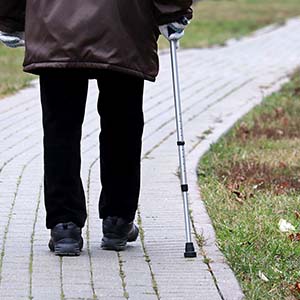-
September 10: The Week in Cancer News
9/11 first responders' cancer survival compares favorably to the general population, and a study identifies different mutational signatures in lung cancers from never-smokers
by Marci A. Landsmann
-
September 3: The Week in Cancer News
Researchers investigate how antibiotics might increase the risk of colon cancer, and the FDA approves a treatment for Waldenström macroglobulinemia.
by Bradley Jones
-
An Emerging Treatment for Metastatic Prostate Cancer
A drug that delivers radioactive particles to prostate cancer cells increases overall survival for metastatic castration-resistant prostate cancer.
by Pamela Rafalow Grossman
-
August 27: The Week in Cancer News
Regular exercise can help mitigate cognitive problems associated with chemotherapy, and researchers learn more about the link between cholesterol and cancer.
by Bradley Jones
-
Exercise, Cancer and Aging
A study on aging shows that cancer survivors are at higher risk of losing strength and walking more slowly compared to those with no cancer history. Exercise is one way to combat this decline.
by Marcus A. Banks
-
August 20: The Week in Cancer News
Patient volume at radiation therapy clinics can affect outcomes, and experts call attention to a third breast cancer gene, PALB2.
by Marci A. Landsmann
-
August 13: The Week in Cancer News
Survival is not affected by delaying breast cancer treatment for fertility preservation, and the FDA approves a drug combination to treat kidney cancer.
by Kevin McLaughlin
-
Preconceived Notions: Cancer, Fertility Coverage and the Law
Insurance coverage for fertility treatments is not mandated by federal law, although some states require it. People seeking cancer treatment need to understand their coverage and the law in their state.
by Shelly Rosenfeld
-
August 6: The Week in Cancer News
The father of a child diagnosed with brain cancer calls for better financial support for families, and a task force aims to find out more about AYA patients' quality of life.
by Bradley Jones
-
Drug Delays Recurrence in People With Early-Stage Breast Cancer
People who have inherited BRCA mutations and are at high risk for cancer recurrence may benefit from a PARP inhibitor.
by Pamela Rafalow Grossman
Cancer Talk
Many People Don’t Get Colonoscopy After Receiving Abnormal Blood Tests
About half of people who receive abnormal results from colorectal cancer screening tests don’t follow up with a colonoscopy.
by Laura Gesualdi Gilmore
Can Steroids Impair Immunotherapy for Cancer?A new study suggests steroids could blunt the effects of some immunotherapies, but researchers say they remain necessary for some patients.
by Kyle Bagenstose
Treatment Combination Improves Survival in Platinum-resistant Ovarian CancerPreliminary results found that combining relacorilant with nab-paclitaxel improved outcomes for women with advanced ovarian cancer.
by Sandra Gordon
CAR T-cell Therapy Shows Response in Rare Brain CancerPotential new approach to treating diffuse intrinsic pontine glioma uses engineered immune cells infused directly to the brain.
by Taneia Surles














